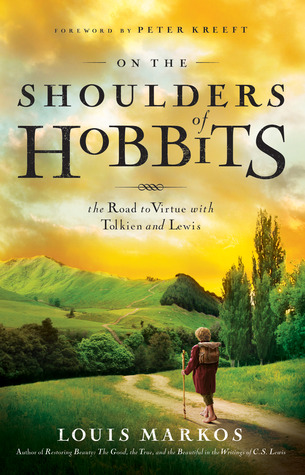I'm taking a study break and thought I'd do an update of what I'm reading as of late. (And no, sorry, I am not including textbooks. No way.)
 |
| Anna Karenina |
No. 1: Anna Karenina, by Leo Tolstoy
Alright, alright; the main plot of this Russian masterpiece is about an affair, and though I will in no way justify it, I will say that the Russian writers knew how to get inside someone's head and expose thought processes. (However...if anyone asks, Crime and Punishment, by Russian Fyodor Dostoevsy is on my optimum quod lectum est list, that is, the best that has been read. By me of course. It surpasses all.) But I digress: Anna Karenina is a piece of art in the literature world, and I am glad to be able to drink it in.
 |
| On the Shoulders of Hobbits |
No. 2: On the Shoulders of Hobbits, by Louis Markos
One of my prizes (as in free books) from the amazingly enriching Desiring God 2013 National Conference is On the Shoulders of Hobbits, a very appropriate expository book at this time, especially with The Hobbit being serialized for us.
I picked this book because I adore Lewis and Tolkien and appreciate the "compare and contrast" formulas. Markos explains how both Tolkien and Lewis used the imagined to portray reality and the extremes of good versus evil.
 |
| Erasing Hell |
No. 4, Erasing Hell, by Francis Chan
This is last, but certainly not least.I have been very sobered by this
since a classmate blatantly stated they did not believe in hell. Calling themselves a christian, they stated that God couldn't be "all good and loving if he sent people to hell."
So I delved.
In this book, Chan discusses many angles and biblical answers, but the one I found to be the most beneficial is that since God IS perfect (which both parties agree on), have we ever stopped to realize that his plans, judgments, and decisions are completely unlike ours? Higher than ours? Above ours? His ways are not our ways! If that is taken into consideration and we take God out of the box we've put him into, we may start to understand that Holiness and justice God so readily calls His own is further beyond ours than we will know
No. 4 The Proteus Effect, by Ann B. Parson
This book focuses on stem cell research, how people research stem cells, and what the benefits of stem cells are. Proteus, a mythical Greek god, was one who could change his shape or form to meet his own purpose. The analogy to stem cells is that these cells are so young that they can keep dividing (ever new, ever young) into practically any organ in the body. It's "groundbreaking." It's fascinating. But is it right?
Though not a textbook, I found it in the genetic research shelf of the library, and as the human genome and what people are actually doing with it interests me, I decided to carefully read this book. So far it's not as horrific as Clockwork Orange (which I couldn't finish for abundance of obscenity), but I have a feeling it is going to be an immense eye opener for me, especially since I am going into the medical field.
I hope you're all staying warm and reading your own good books!

No comments:
Post a Comment